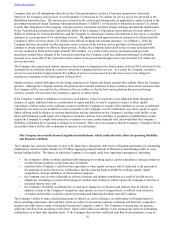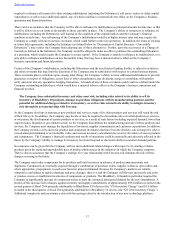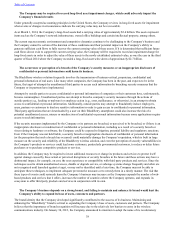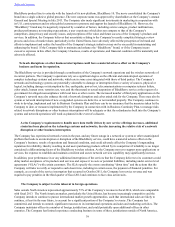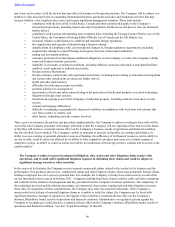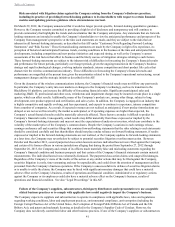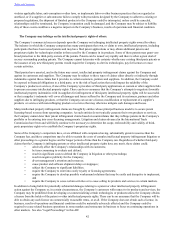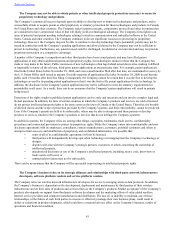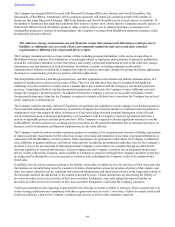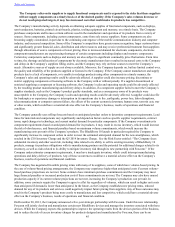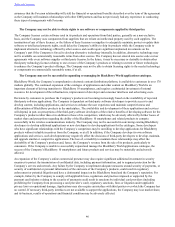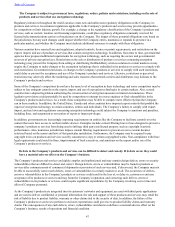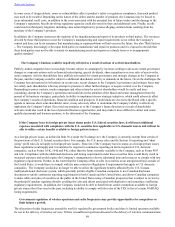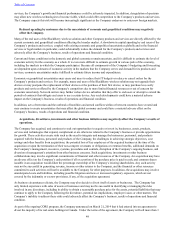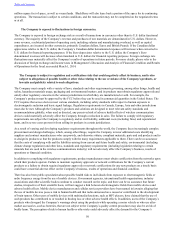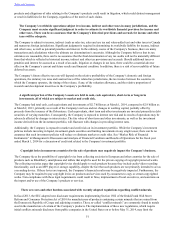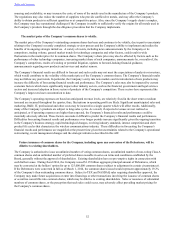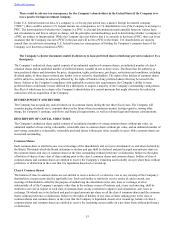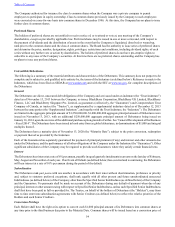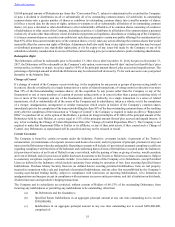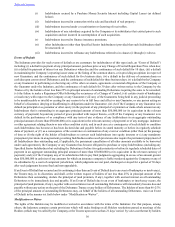Blackberry 2014 Annual Report Download - page 54
Download and view the complete annual report
Please find page 54 of the 2014 Blackberry annual report below. You can navigate through the pages in the report by either clicking on the pages listed below, or by using the keyword search tool below to find specific information within the annual report.
46
assurance that the Foxconn relationship will yield the financial or operational benefits described over the term of the agreement
as the Company will maintain relationships with other EMS partners and has not previously had any experience in conducting
these types of arrangements with Foxconn.
The Company may not be able to obtain rights to use software or components supplied by third parties.
The Company licenses certain software used in its products and operations from third parties, generally on a non-exclusive
basis, and the Company uses components from suppliers that are reliant on intellectual property used by such suppliers. The
termination of any of these licenses, or the failure of these licensors or suppliers to adequately maintain, protect or update their
software or intellectual property rights, could delay the Company’s ability to ship its products while the Company seeks to
implement alternative technology offered by other sources and could require significant unplanned investments on the
Company’s part if the Company is forced to develop alternative technology internally. In addition, alternative technology may
not be available on commercially reasonable terms from other sources. The Company has not entered into source code escrow
agreements with every software supplier or third party licensor. In the future, it may be necessary or desirable to obtain other
third-party technology licenses relating to one or more of the Company’s products or relating to current or future technologies
to enhance the Company’s product offerings. The Company may not be able to obtain licensing rights to the needed technology
or components on commercially reasonable terms, if at all.
The Company may not be successful in expanding or managing its BlackBerry World applications catalogue.
BlackBerry World, the Company’s comprehensive electronic content distribution platform, is available to customers in over 170
markets globally. The continued expansion of the catalogue of applications and other content on BlackBerry World is an
important element of driving transition to BlackBerry 10 smartphones, and requires a substantial investment of internal
resources for development of the infrastructure, improvement of developer and consumer interfaces and advertising costs.
Decisions by customers to purchase the Company’s products are becoming increasingly based on the availability of top-rated
third-party software applications. The Company is dependent on third-party software developers to provide access to and
develop content, including applications, and services to enhance the user experience and maintain competitiveness and
differentiation of BlackBerry products in the marketplace. The availability and development of these applications and services
will depend, in part, on perceptions of the third-party software developers of the relative benefits of developing software for the
Company’s products rather than or in addition to those of its competitors, which may be adversely affected by further losses of
market share and perceptions regarding the ability of the BlackBerry 10 smartphones and related products to compete
successfully in the wireless communications industry. The Company may not be successful in convincing existing BlackBerry
developers to develop additional applications or new developers to develop applications for the catalogue. Some developers
who have significant relationships with the Company’s competitors may be unwilling to develop applications for BlackBerry
products without valuable incentives from the Company, or at all. In addition, if the Company develops its own software
applications and services, such development may negatively affect the decisions of third-party developers to develop, maintain,
and upgrade similar or competitive applications. The loss of, or inability to maintain these relationships may affect the
desirability of the Company’s products and, hence, the Company’s revenue from the sale of its products, particularly to
consumers. If the Company is unable to successfully expand and manage the BlackBerry World applications catalogue, the
success of the Company’s BlackBerry 10 smartphones and future products and services may be materially and adversely
affected.
An expansion of the Company’s online commercial presence may also require significant additional investment in security
measures to protect the transmission of confidential data, including payment information, and to augment protection for the
Company’s servers and network. Any failure by the Company to implement adequate measures around security of payments, or
security of confidential or personal information of the end users of the Company’s products, could result in regulatory
enforcement or potential litigation and have a detrimental impact on the BlackBerry brand and the Company’s reputation. For
example, failure by the Company to comply with applicable laws, regulations and practices imposed or supported by the
payment card industry relating to the security of payments could result in sanctions by individual card providers (including
prohibiting the Company from processing a card provider’s card), regulatory sanctions, fines or litigation under applicable
privacy laws or reputational damage. Applications may also require an interface with third parties over which the Company has
no control. If necessary third-party interfaces are not available to support the applications, the Company may lose market share,
and its business, results of operations and financial condition may be adversely affected.
Table of Contents


